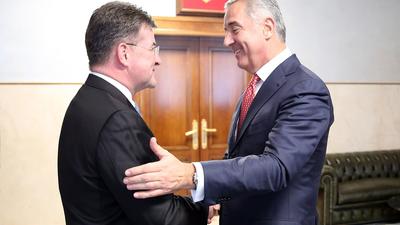-
Our work
-
Fields of work
- Arms control
- Border management
- Combating trafficking in human beings
- Conflict prevention and resolution
- Countering terrorism
- Cyber/ICT Security
- Democratization
- Economic activities
- Education
- Elections
- Environmental activities
- Gender equality
- Good governance
- Human rights
- Media freedom and development
- Migration
- National minority issues
- Policing
- Reform and co-operation in the security sector
- Roma and Sinti
- Rule of law
- Tolerance and non-discrimination
- Youth
- Field operations
- Projects
-
Meetings and conferences
- Summit meetings
- Review Conferences
- Ministerial Council meetings
- Plenary meetings of the Permanent Council
- Plenary Meetings of the Forum for Security Co-operation
- Security Review Conferences
- Annual Implementation Assessment Meetings
- Economic and Environmental Forum
- Economic and Environmental Dimension Implementation Meetings
- Human rights meetings
- Media conferences
- Cyber/ICT security conferences
- Conference of the Alliance against Trafficking in Persons
- Gender equality conferences
- Annual OSCE Mediterranean conferences
- Annual OSCE Asian conferences
- Partnerships
-
Fields of work
-
Countries
- All
-
Participating States
- Albania
- Andorra
- Armenia
- Austria
- Azerbaijan
- Belgium
- Belarus
- Bosnia and Herzegovina
- Bulgaria
- Canada
- Croatia
- Cyprus
- Czechia
- Denmark
- Estonia
- Finland
- France
- Georgia
- Germany
- Greece
- Holy See
- Hungary
- Iceland
- Ireland
- Italy
- Kazakhstan
- Kyrgyzstan
- Latvia
- Liechtenstein
- Lithuania
- Luxembourg
- Malta
- Moldova
- Monaco
- Mongolia
- Montenegro
- The Netherlands
- North Macedonia
- Norway
- Poland
- Portugal
- Romania
- Russian Federation
- San Marino
- Serbia
- Slovakia
- Slovenia
- Spain
- Sweden
- Switzerland – OSCE Chairpersonship 2026
- Tajikistan
- Türkiye
- Turkmenistan
- Ukraine
- United Kingdom
- United States of America
- Uzbekistan
- Asian Partners for Co-operation
- Mediterranean Partners for Co-operation
-
Structures and institutions
- Chairpersonship
-
Secretariat
- Secretary General
- Office of the Secretary General
- Conflict Prevention Centre
- Transnational Threats Department
- Office of the Special Representative and Co-ordinator for Combating Trafficking in Human Beings
- Office of the Co-ordinator of OSCE Economic and Environmental Activities
- Gender Issues Programme
- Opportunities for Youth
- Department of Human Resources
- Department of Management and Finance
- Office of Internal Oversight
- Documentation Centre in Prague
- Institutions
-
Field operations
- Presence in Albania
- Centre in Ashgabat
- Programme Office in Astana
- Programme Office in Bishkek
- Mission to Bosnia and Herzegovina
- Programme Office in Dushanbe
- Mission in Kosovo
- Mission to Moldova
- Mission to Montenegro
- Mission to Serbia
- Mission to Skopje
- Project Co-ordinator in Uzbekistan
- Closed field activities
- Parliamentary Assembly
- Court of Conciliation and Arbitration
- Organizational structure
- About us
Press release
Montenegro is a success story for democratic transformation in South-Eastern Europe stresses OSCE Chairperson-in-Office Lajčák

- Date:
- Place:
- PODGORICA
- Source:
- OSCE Chairpersonship, OSCE Mission to Montenegro
PODGORICA, 8 May 2019 – OSCE Chairperson-in-Office and Slovakia’s Foreign and European Affairs Minister Miroslav Lajčák, today in Podgorica, called Montenegro a success story for democratic transformation and Euro-Atlantic integration, and a role model for the region. “In the last two decades, Montenegro has made huge progress in consolidating peace and stability,” Lajčák said.
During his stay in Montenegro, the first South-Eastern European country he has visited since taking office in January, Chairperson Lajčák underlined the wide range of challenges the region is facing, ranging from deep-rooted grievances and the ongoing process of reconciliation, to the need to strengthen rule of law and freedom of the media.
“Other phenomena, such as illegal migration flows and violent extremism, continue to pose a threat to the country and the region. These challenges endanger the region’s aspirations and the stability of other participating States.” At the same time, he pointed to the value of the OSCE in this regard, as an organization which strives for regional approaches to regional challenges.
Emphasizing the strong and very practice-oriented Montenegrin-OSCE partnership, in particular on reforming the electoral system, building a free, resilient and professional media landscape, promoting security sector governance and reform, and strengthening regional youth co-operation in collaboration with RYCO, in his meetings with President Milo Đukanović, Prime Minister Duško Marković, Minister of Foreign Affairs Srdjan Darmanović, and Speaker of the Parliament Ivan Brajović, Minister Lajčák referred to the achievements made. “In the region, the OSCE has come a long way from assisting in the establishment of key democratic institutions to helping to build their functionality and strengthening their relationship with citizens,” he said.
Lajčák stressed that listening to critical voices is key in a maturing democracy. “Differences should be debated in parliament by all representatives, including the opposition. Boycotting cuts off any chance of dialogue - and therefore any chance of finding common ground. The only way to achieve progress is through dialogue.”
The Chairperson also met with representatives of civil society, key actors in reforming Montenegro and important partners of the OSCE Mission, and took the opportunity to show what Slovakia’s OSCE slogan “for people, dialogue and stability” means in action, delivering a bio-microscopic slit lamp to the hospital Klinički Centar and announcing Slovakia’s support for the reconstruction work of the Tanasije Petrović Grammar School in Pljevlja.
While in Montenegro, Minister Lajčák was awarded the honorary title of Doctor Honoris Causa of the University of Montenegro as an acknowledgement of his contribution to the transformation of the country.